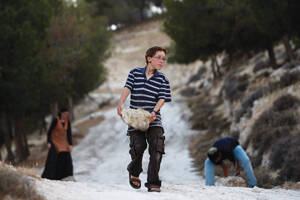President Barack Obama’s call for Israeli and Palestinian states based on Israel’s 1967 borders met with a largely wary response from Palestinian Christians. While the Palestinians welcomed the president’s proposal, made in speeches on May 19 and 22—which includes mutually agreed-upon land swaps—they doubted that Israel would easily back away from Palestinian territory it has occupied for nearly 44 years.
Sami Awad, executive director of the Holy Land Trust and a promoter of nonviolent resistance against the Israeli occupation of Palestinian territory, said: “It was like every other president, he pushes the envelope a bit more than the previous president. That’s not enough.” The plight of Palestinian refugees, he said, must be recognized and solved.
Hussam Elias, an Arab Catholic who lives in Cana, Israel, directs the Galilee program for the Jerusalem Center for Jewish-Christian Relations. He noted that the crucial issue of the final status of Jerusalem had been left out of Obama’s proposals. Even so, Obama’s speeches were an indication that “the time had come” for Palestinians and Israelis to make serious moves toward a final and just peace agreement, Elias said.
“It is clear that with the revolutions in the Middle East and all the social and political changes taking place, the current situation cannot continue,” he said. “Israel needs to decide if it wants to be a part of the new Middle East or to be left out alone.”
The Rev. Raed Abusahlia, priest of Holy Redeemer Church in the West Bank village of Taybeh, said most of his parishioners believed the Americans and Israelis were “wasting their time” and preferred to see concrete action to bring about peace. “We will continue our regular daily life,” Father Abusahlia said. “We are here, and we will remain here, and at the end there will be a solution, but not now. We can wait another generation.”
Father Abusahlia said he was pleased with Obama’s call for a two-state solution with Israel’s 1967 borders as a starting point for talks, but the priest said Prime Minister Benjamin Netanyahu’s strong opposition was predictable. He accused the Israeli leader of stalling peace talks until the completion of the 400-mile separation wall, which will leave Jewish settlement blocs on some 40 percent of what he says is Palestinian land. The land will then become nonnegotiable “facts on the ground” for Israelis, he said.
The priest also said the existence of one state would suffice as long as all residents—Jews, Christians, Druze and Muslims alike—lived in equality. He doubted that most Israelis, who insist on recognition of the Jewish nature of Israel, would accept such a proposition. Warning that Israel is quickly losing its regional allies, Father Abusahlia called for Israel to make peace “once and forever before it is too late.”








